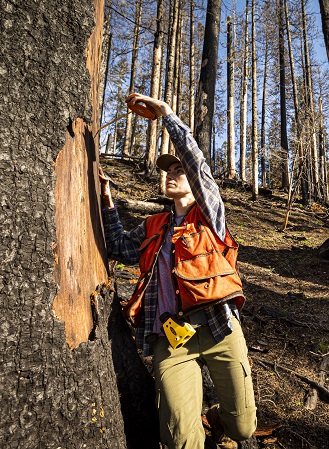ESRM: Sustainable Forest Management Academic Requirements
In the ESRM: Sustainable Forest Management Option, for their final credits of degree requirements students acquire the knowledge and skills to measure and assess natural resources to understand the ecology of forest systems; manage for environmental services; treat forest fuels; achieve sustainable harvest; market and sell forest products; and understand how social, economic, and ecologic forces impact the management of forests and their resources.
Students earn a B.S., Environmental Science and Terrestrial Resource Management. The Option in Sustainable Forest Management is noted on student transcripts only, not the diploma.
The Sustainable Forest Management option is accredited by the Society of American Foresters through 2027.
Schedules
Schedules are available over on the Academic Planning Resources page.
Required Sustainable Forest Management Option Courses
All pathways in ESRM require the same set of ESRM Core courses, UW General Education requirements, and fundamental Science, Math, and Social Science course content. The only distinction is in the final set of upper division course requirements (40-55 credits, depending on the pathway chosen and the classes selected within that pathway).
Required Sustainable Forest Management Option courses
ESRM 323 (5) Silviculture
ESRM 331 (3) Landscape Plant Recognition
ESRM 368 (4) Natural Resources Measurements
ESRM 400 (3) Natural Resource Conflict Management
ESRM 426 (4) Wildland Hydrology OR ESRM 447 (3) Watershed Ecology and Management
ESRM 428 (5) Principles of Silviculture and Their Application
ESRM 430 (5) Hi-Res Remote Sensing
ESRM 461/SBSE 461 (5) Forest Management and Economics
ESRM 470 (5) Natural Resource Policy and Planning
Choose one course from each topic area:
Forest Ecology and Biology
ESRM 325 (3) Environmental Applications of Plants: Bioenergy and Bioremediation
ESRM 350 (5) Wildlife Biology and Conservation
ESRM 404 (5) Plant Microbiology Laboratory
ESRM 409 (5) Soil Ecology
ESRM 410 (5) Forest Soils and Site Productivity
ESRM 415 (5) Terrestrial Invasion Ecology
ESRM 435 (3) Insect Ecology OR ESRM 478 Plant Ecophysiology (5)
Forest Resource Management
ESRM 381 (4) Management of Wildland Recreation and Amenities
ESRM 401 (5) Forest Ecology
ESRM 420 (5) Wildland Fire Management
ESRM 425 (5) Ecosystem Management
ESRM 468 (5) Forest Operations
Forest Resource Policy, Economics and Admin
ESRM 320 (5) Marketing and Human Resources
ESRM 423 (3) International Trade, Marketing, and the Environment
ESRM 465 (3) Economics of Conservation
Career Opportunities
This SAF-accredited option can lead directly into an SAF-accredited Master of Forest Resources and/or can be used to satisfy the educational requirements of the SAF’s Candidate Certified Forester (CCF) title. Career possibilities include positions responsible for forest stand examination, stream sampling, amphibian and/or bird surveys as they relate to Habitat Conservation Plans, silviculture prescription writing, riparian management zone (stream buffer) layout, timber “cruising,” timber sale layout, and harvest setting layout.
Graduate Study
Students may choose to apply for the Master of Forest Resources (MFR) degree. The MFR is a non-thesis profession master’s degree that can be completed in just one additional year if the Sustainable Forest Management option is completed. This advanced degree can provide additional experience for those desiring more in-depth knowledge of the field and for those inclined toward leadership roles in their careers.
SEFS Faculty
Ernesto Alvarado, Gregory Ettl, Jim Fridley, Brian J. Harvey, Britt Johnson, L. Monika Moskal, Sergey Rabotyagov, Clare Ryan, Patric Tobin, Sándor F. Tóth, Eric Turnblom (lead), Aaron Wirsing
